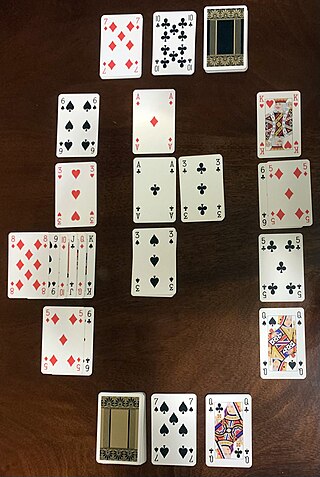
Games of patience, or (card) solitaires as they are usually called in North America, have their own 'language' of specialised terms such as "building down", "packing", "foundations", "talon" and "tableau". Once learnt they are helpful in describing, succinctly and accurately, how the games are played. Patience games are usually for a single player, although a small number have been designed for two and, in rare cases, three or even four players. They are games of skill or chance or a combination of the two. There are three classes of patience grouped by object.

Klondike is a card game for one player and the best known and most popular version of the patience or solitaire family, as well as one of the most challenging in widespread play. It has spawned numerous variants including Batsford, Easthaven, King Albert, Thumb and Pouch, Somerset or Usk and Whitehead, as well as the American variants of the games, Agnes and Westcliff. The distinguishing feature of all variants is a triangular layout of the tableau, building in ascending sequence and packing in descending order.

Clock or Sundial is a luck-based patience or solitaire card game with the cards laid out to represent the face of a clock. It is closely related to Travellers.

Russian bank, crapette or tunj, historically also called the wrangle, is a card game for two players from the patience family. It is played with two decks of 52 standard playing cards. The U.S. Playing Card Company, who first published its rules in 1898, called it "probably the best game for two players ever invented".
The Carpet is a patience or solitaire game where the object is to discard all cards to the foundations where the aces are already dealt. It is a simple game relatively easy to get out more often than not.
Accordion is a patience or card solitaire using a single deck of playing cards. It is so named because it looks like accordion pleats, which have to be ironed out. The object is to compress the entire deck into one pile like an accordion.
Amazons is an old patience or card solitaire game which is played with a single deck of playing cards. The game is played with a Piquet pack minus the kings or a standard 52-card pack that has its twos, threes, fours, fives, sixes, and kings removed. This game is named after the female-led tribe, the Amazons, because the queen is the highest card, and all queens are displayed if the game is won.

Four Seasons is a patience or card solitaire which is played with a single deck of playing cards. It is also known as Corner Card and Vanishing Cross, due to the arrangement of the foundations and the tableau respectively. Another alternate name is Cross Currents.
Zodiac is a solitaire card game which is played with two decks of playing cards shuffled together. An old game, it first appeared in Lady Adelaide Cadogan's book Illustrated Games of Patience. It is so-named probably because of its "globe"-shaped layout. It had many variations until its rules were standardized in 1914.
Jubilee is the name given to two solitaire card games, both played with two decks of playing cards. Both games are so-called because they were created during the time of the Golden Jubilee of Queen Victoria in 1887. One of the games has an ornate layout, while the other is simpler and it belongs to the family of games which include Sir Tommy, Strategy, and Calculation.

German Rummy or Rommé is the most popular form of the worldwide game, Rummy, played in Austria and Germany. It is a game for 2 to 6 players and is played with two packs of French playing cards, each comprising 52 cards and 3 jokers. There are no partnerships. In Germany, the Germany Rummy Association is the umbrella organisation for local rummy clubs and organises national competitions. The game is often just known as Rommé in Germany and Rummy in Austria.
Travellers is a card game of the patience or card solitaire genre which uses a single card pack of either 52 or 32 playing cards. It is an interesting game based on "an entirely new principle" which Parlett describes as a "rhythmical feature that might be called 'shuttling'", as in the game of Weavers. It should not be confused with the twin-pack patience game, also called Travellers.
Päckchen is a German card game of the patience genre.

Hope Deferred is a simple game of patience, played with a French-suited Piquet pack of 32 cards. The aim of the game is to get rid of all the Clubs from the pack.
Quadrat ("Square") or Viereck ("Rectangle") is a simple, German patience game, which is played with a French pack of 32 or 52 cards. Zudecken ("Covering") is a very similar patience with slightly altered rules.
Good Thirteen is a simple, German patience game for one person, played using a French pack of 52 playing cards. It also goes under the name Thirteens.
Eight Cards is a simple, German patience game for one player, that is played with a French pack of 52 cards.

Solo 66 is a trick-taking ace–ten card game for five players, in which a soloist always plays against the other four. It is based on the rules of Germany's national game, Skat, and is played with a French-suited Skat pack of 32 cards. Bidding is for the trump suit. Jacks are ranked within their respective suits and do not form additional trumps over and above the cards of the trump suit. Grupp describes it as "an entertaining game for a larger group."

Blüchern is a simple gambling card game for any number of players that is played either with a pack of 52 French playing cards or with a pack of 32 French or German playing cards.
Counting Patience is a simple patience game that can be played with a French Skat pack of 32 cards or a standard French pack of 52 cards.

















